For those building quad core servers, the Intel Xeon E3-1220 V6 is the lowest cost option in the Kaby Lake generation. For more than six years now, the E3-1220 model has been the go-to option for getting a low-cost CPU to light up a Xeon E3 platform. The chips are four core, four thread designs with a 3.0GHz base clock and 3.5Ghz turbo and a generous 72w TDP.
Generally, these chips are priced lower than their competition. In extremely cost-sensitive segments of the market, OEMs will use these to say boxes have Xeons onboard. You do give up a lot in the process. Here is an excerpt from our Intel Xeon E3-1200 V6 value comparison piece:

If you have an application that cannot use hyper-threading, these are a good value. On the other hand, these days most applications can use the extra threads, so it becomes a question of whether $57 or so is worth losing a significant amount of performance.
Test Configuration
For this setup, we used what we would expect to be a fairly typical server:
- CPU: Intel Xeon E3-1220 V6
- Motherboard: Supermicro X11SSH-F
- RAM: 2x 16GB ECC DDR4-2400 (Crucial)
- SSD: Intel DC S3710 400GB
- OS: Ubuntu 14.04.5 LTS (performance benchmarks), Ubuntu 16.04.2 LTS, VMware ESXi 6.5, Centos 7.3
We did want to take a moment and discuss some of the comparison data we are going to use. We do have the entire AMD Ryzen SKU stack to data along with the entire Xeon E3-1200 V6 range’s CPU core/ clock variants. We also have some legacy data points to give additional perspective.
The Ryzen comparison is tough. Although it supports ECC memory on the CPU, we still are not seeing enough software maturity to call it a stable server platform. Also, there are great workstation platforms but no real server platforms at the time of this writing. If you want a server, you want E3-1200 V6. If you are building a workstation with a NVIDIA or AMD GPU, Ryzen is certainly a competitor.
We have the Intel Core i7-7700 and i7-7700K chips in the comparison as well. Although many vendors will say workstations require ECC memory, there are plenty of customers who will trade ECC memory for 25% more performance.
Intel Xeon E3-1220 V6 Benchmarks
For our testing, we are using Linux-Bench scripts which help us see cross platform “least common denominator” results. We are using gcc due to its ubiquity as a default compiler. One can see details of each benchmark here. We are likely going to update the Linux-Bench shortly with a few new tests as well as an even simpler to use/ faster revision, but for now, we are using the legacy version that now has over 100,000 test runs under its belt.
Python Linux 4.4.2 Kernel Compile Benchmark
This is one of the most requested benchmarks for STH over the past few years. The task was simple, we have a standard configuration file, the Linux 4.4.2 kernel from kernel.org, and make with every thread in the system. We are expressing results in terms of compiles per hour to make the results easier to read.
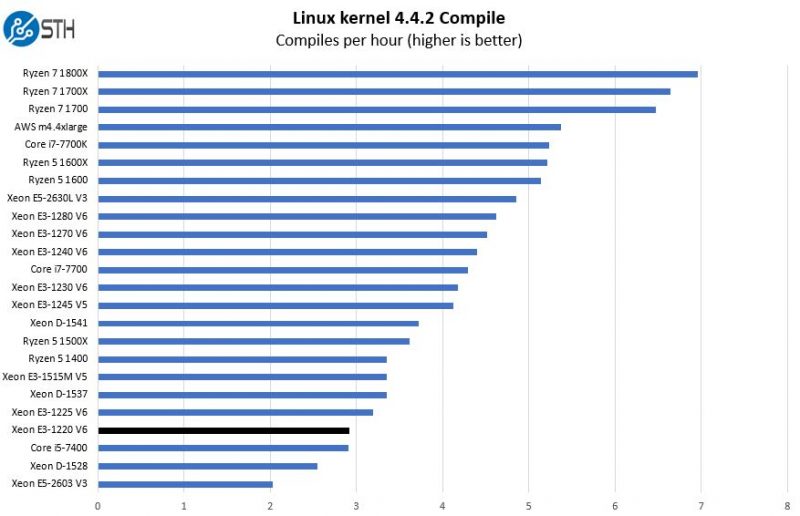
Using gcc to compile the Linux project shows a significant delta between this chip, the E3-1225 V6 and the E3-1230 V6. The Intel Xeon E3-1225 V6 has the same core/ thread count but boasts ~10% higher clock speeds at a 10% price premium. Likewise, the E3-1230 V6 gets both higher clock speeds and twice as many threads with a 20% premium.
c-ray 1.1 Performance
We have been using c-ray for our performance testing for years now. It is a ray tracing benchmark that is extremely popular to show differences in processors under multi-threaded workloads.
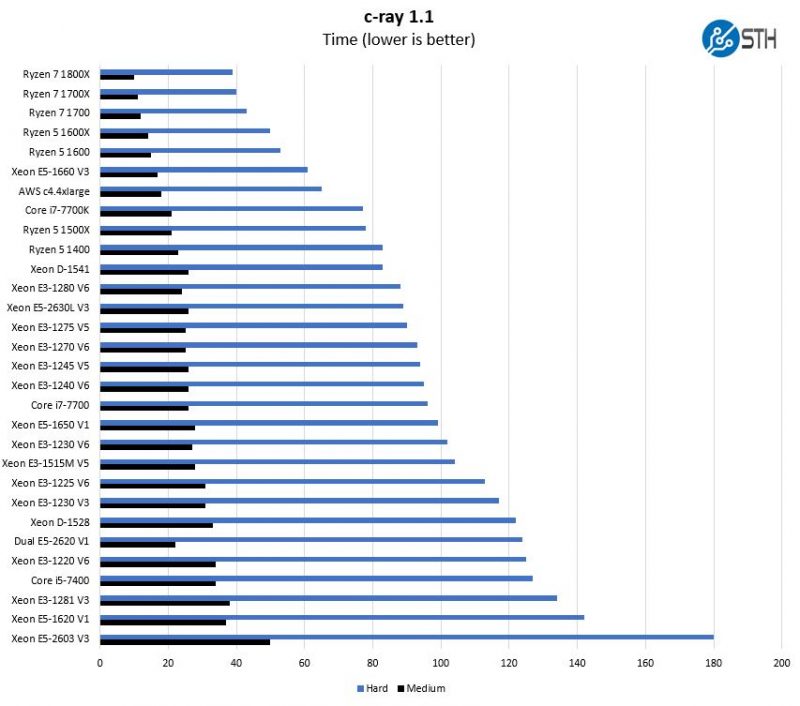
This is a benchmark that scales well with hyper-threading so even with IPC improvements the new Kaby Lake chips is left behind.
7-zip Compression Performance
7-zip is a widely used compression/ decompression program that works cross platform. We started using the program during our early days with Windows testing. It is now part of Linux-Bench.
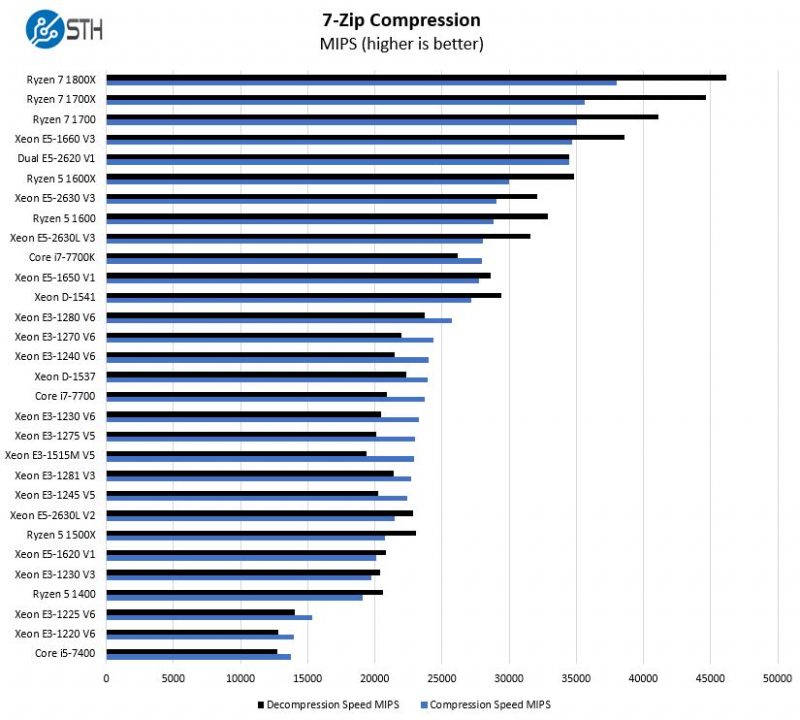
Regarding compression speed, again we see the Intel Xeon E3-1220 V6 near the bottom of the pack.
NAMD Performance
NAMD is a molecular modeling benchmark developed by the Theoretical and Computational Biophysics Group in the Beckman Institute for Advanced Science and Technology at the University of Illinois at Urbana-Champaign. More information on the benchmark can be found here. We may replace this or augment with GROMACS in the next-generation Linux-Bench as that test is currently running through regressions.
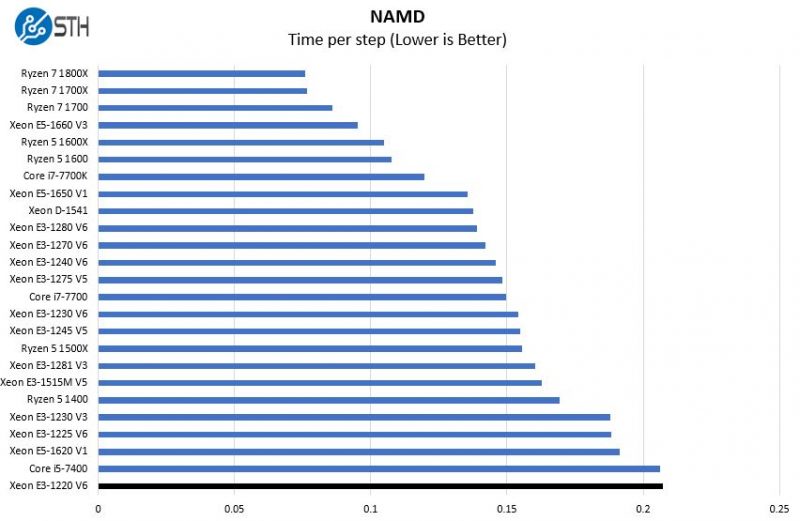
Here it swaps places with the Core i5-7400 desktop counterpart by a tiny margin to fall to the bottom of our comparison chart.
Sysbench CPU test
Sysbench is another one of those widely used Linux benchmarks. We specifically are using the CPU test, not the OLTP test that we use for some storage testing.
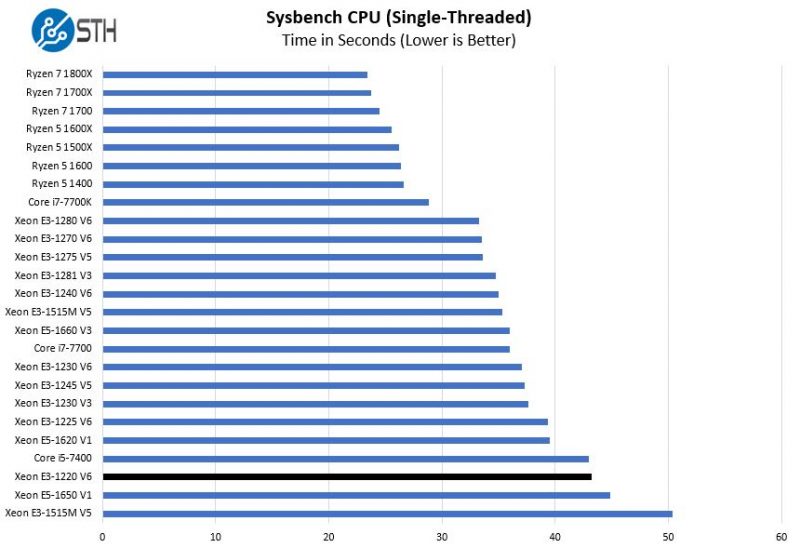
Many workloads are still single-thread bound. The newer architecture and lack of hyper-threading do help the chip slightly in this single threaded workload.
OpenSSL Performance
OpenSSL is widely used to secure communications between servers. This is an important protocol in many server stacks. We first look at our sign tests:
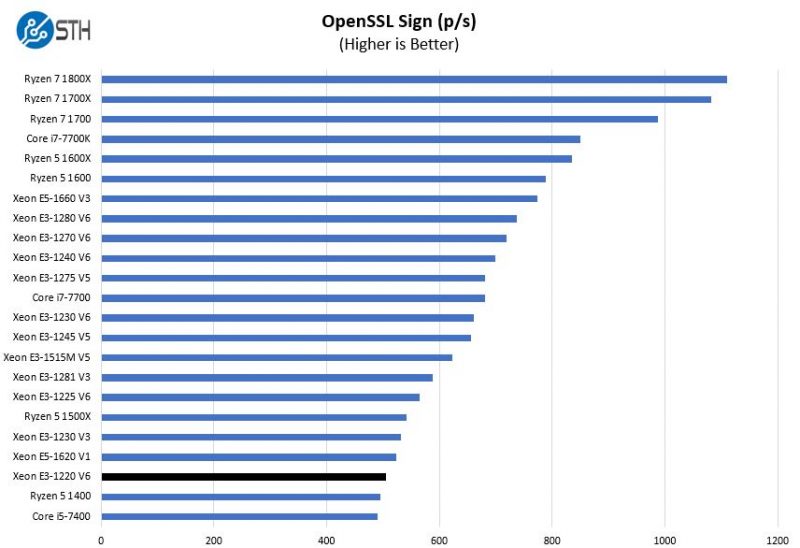
And our verify tests:
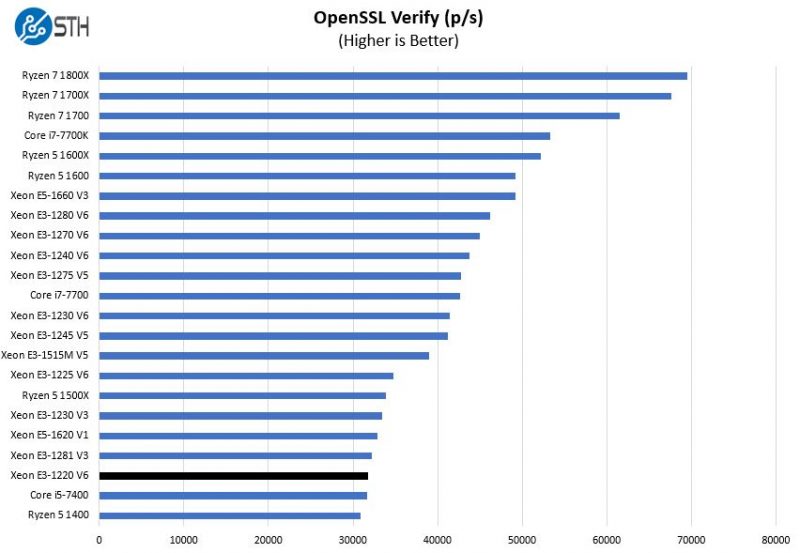
Here is an interesting chart as it shows the 4 core/ 4 thread Intel Xeon E3-1220 V6 with a 3.0GHz base clock and 3.5GHz turbo edge out the 4 core 8 thread AMD Ryzen 5 1400 CPU with a 3.2GHz base clock.
UnixBench Dhrystone 2 and Whetstone Benchmarks
One of our longest running tests is the venerable UnixBench 5.1.3 Dhrystone 2 and Whetstone results. They are certainly aging. However, we constantly get requests for them, and many angry notes when we leave them out. UnixBench is widely used, so it is a good comparison point.
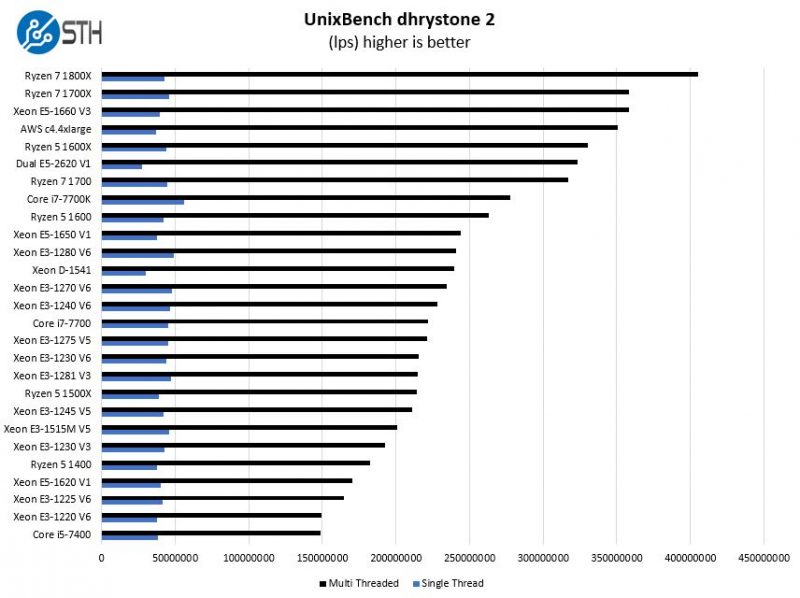
The lower clock speeds and lack of hyper-threading do hurt the CPU performance here.
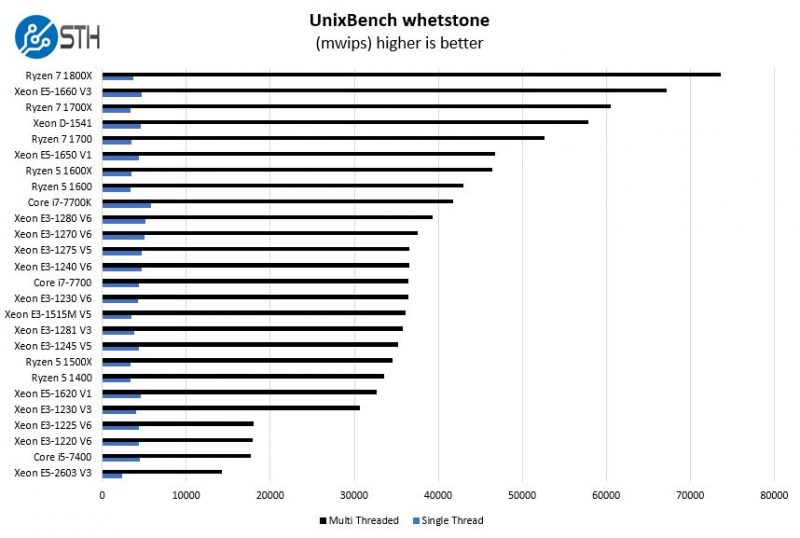
Likewise, we can see the Intel Xeon E3-1220 V6 about on par with the Intel Core i5-7400. We also see a significant jump in speed based on the number of threads a CPU can handle.
Final Words
Much like the Intel Xeon E5-2603/ 2609, there are certain chips that are seemingly available simply to light a platform at a lower cost. This is one of those examples. For a relatively small amount (in terms of system cost) upgrading to an Intel Xeon E3-1230 V6 is our recommendation if you are running compute-heavy workloads. At the same time, if you are building a storage server, a simple network services appliance (e.g. running DHCP or PXE boot services), then the Intel Xeon E3-1220 V6 is a reasonable choice.

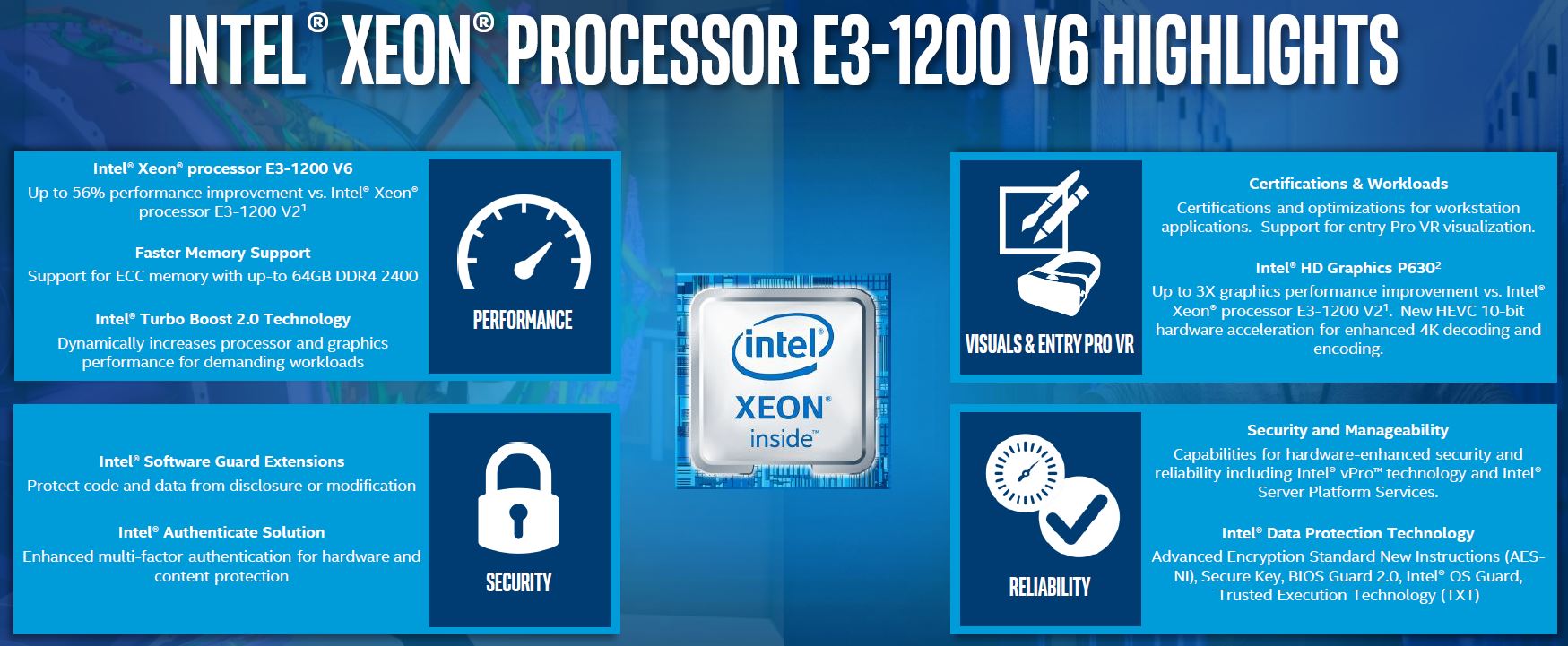

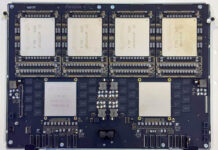
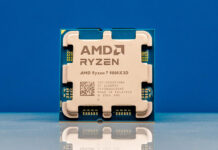
another mistake: complies per hour
should be COMPILES
Thanks for this amazing analysis on this chip. Dealing with one of these at a client of mine and found your article extremely helpful.